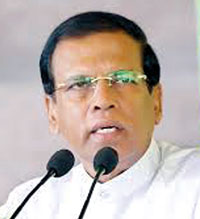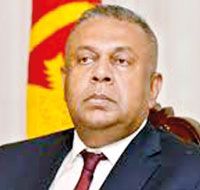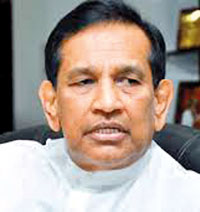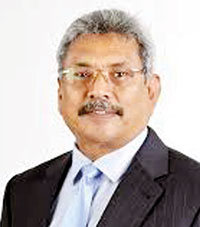Columns
Mangala’s fag gift to Chinese ‘locals’ on World Tobacco Day
View(s):
SIRISENA: Wants to totally ban tobacco cultivation
For a man who declared only last week without anyone prompting him to put his foot and mouth in the dung, that Sri Lanka is not a Sinhalese Buddhist nation that the majority clan can lay claim to despite the historical antecedents that mark its origins and notch every mile post of its annals with its litany of contributions; and that the land belonged to all in equal measure, no matter from whence or when they came, to the Tamils, the Muslims, the Burgers and the Malays, Finance Minister Mangala Samaraweera extended his liberal doctrine on Thursday to include in his liberal equation the Chinese as well.
Can’t blame him, now can you?
After all, the previous Rajapaksa regime had granted sovereign rights over the Lankan seas to the Chinese to build a port city of their own off Colombo’s shores and give home to more than a hundred thousand Chinese upon completion in what will soon be a permanent Chinese base camp for the next hundred years. And maybe more, if they refuse to leave when their lease runs out.
Whilst the opposition howls its protest over SOFA and cry that it will enable the Americans to set up a permanent base in Lanka, none of them seems to even squeak a simple protest over the Chinese port city and the loss of Lanka’s sovereignty sold down the sea simply because it was the same opposition who, when they were in government, handed Lanka’s sovereign rights on a platter pandering to the panda of the East.
Thus, perhaps, it was only right for this present government in office — who inherited the sovereignty sellout from the Rajapaksa regime — and, he, as the Finance Minister, to grant the latest entrants to the Lankan demography, the new Chinese kids in town, their fundamental right to smoke the cigarette of their choice: China-made Chinese cigs. And cause a U-turn in the Government’s anti-smoking, anti-tobacco policy.

MANGALA: Wants to open the floodgates to foreign fags
What China wants, China gets. Right to the last drag, to the last puff of the butt.
Finance Minister Mangala Samaraweera opened the floodgates on foreign fags to Lanka when he announced at a press conference: on Thursday: “We are yet to grant any approvals to import cigarettes to anyone. However, if someone wants the opportunity to import, they could submit an application to us and we will surely consider the request.”
And why the 360 degree turn when it has been the declared policy of President Sirisena and the UNP Health Minister Rajitha Senaratne to stub the last butt by the year 2020?
The minister pointed out that there is a significant demand for foreign cigarettes among expatriate community in Colombo, particularly from Chinese nationals who largely depend on cigarettes imported through informal channels.
He said: “The Chinese embassy earlier informed me that these Chinese expats consume cigarettes in large quantities and they only smoke cigarettes originating from China and not the locally manufactured cigarettes.
“Therefore, it’s better to let cigarette imports through proper channels, which would also allow the government to earn revenue,” he said.
According to a recent research report, the government was estimated to have lost Rs.18 billion in cigarette tax revenue in 2017, as a record 583 million illicit cigarettes were estimated to have been smuggled into the country in that year.
“Sri Lanka is a free country, and if someone who is in the right legal age wants to consume foreign branded cigarettes, they should be able to do so,” the liberal minister declared.
Fair enough. That’s the spirit. Live and let live. But when the other communities, namely, the Sinhalese, the Tamils, the Muslims, the Burgers and the Malays, who live in this ‘not a Sinhala Buddhist’ land clamoured for foreign smoke to fill their lungs, the past government which banned it and the present government which maintains it stubbornly refused to heed their request. But now the Finance Minister is bent on giving way, all because the new emigrants, the Chinese — six thousand it is said but definitely much more — demand it as of right to inhale and expel Chinese smoke in Lankan air.

RAJITHA: Wants to totally put a full stop to cigarette smoking
And what’s the Health Minister Rajitha Senaratne, a notable anti-smoking man, stand on this? He was in Geneva — this week when Mangala announced his plan — attending the World Health Organisation summit where he was appointed as the First Vice President giving priority to the Asia Pacific Region coming under his purview. He was first appointed to the same position in 2017 mainly because he was seen as an ardent advocate of the anti-smoking lobby whose wish and determination was to reduce the Lankan tobacco industry to ashes.
And what about the beloved leader of the anti-smoking set. Long before he himself considered himself presidential material, Maithripala Sirisena won his colours at the World Health Organisation by appearing to be the High Priest of the anti-smoking church. And when by a quirk of fate he was catapulted to the highest office in the land, his zeal and fervour leapt in unrestrained bounds. Unlike his predecessor who had merely announced as his chinthanaya in his election manifesto to put a full stop to liquor but did naught thereafter, Sirisena sought to keep a promise he had made as Health Minister.
At every opportunity he could get, he never failed to vow to kill the goose that laid the nation’s golden egg. Even though the larder was bare, and all that had been there had been hocked to the Chinaman.
Sirisena even went to the extent of announcing his plan to ban all tobacco cultivation in the country by the year 2020. It may have served him to earn another award from the World Health Organisation but how would it have affected the Lankan economy?
For even whilst the President can earn his laurels at international forums, hailed as being a captain of the anti-smoking lobby — merely because he parrots their propaganda — and is famed for winning as he did a medal at the World Health Organisation’s summit six years ago when he was serving as the Health Minister of the Rajapaksa government, the question is whether this nation’s people can afford to enjoy the luxury of placing the ‘politically correct’ notion before their bread and butter and encounter with cheer higher taxes when over Rs 100 billion the tobacco industry contributes annually as taxes to the government is wiped out overnight from the nation’s coffers?
 As the Sunday Punch commented on February 24, this year when the Finance Minister was preparing his budget and figuring how to balance the books as far as he possibly could: “When the USA, where the most powerful anti-smoking cult exists, has not shown any fetish to ban or tax cigarettes out of existence, the people here in Lanka must double think whether we live in a utopian state where all vices are non-existent and the air glorious and fresh, smoke free or whether this country is in the ghetto of the third world and must make do with every legal cent that comes its way, no matter what the diehards say.”
As the Sunday Punch commented on February 24, this year when the Finance Minister was preparing his budget and figuring how to balance the books as far as he possibly could: “When the USA, where the most powerful anti-smoking cult exists, has not shown any fetish to ban or tax cigarettes out of existence, the people here in Lanka must double think whether we live in a utopian state where all vices are non-existent and the air glorious and fresh, smoke free or whether this country is in the ghetto of the third world and must make do with every legal cent that comes its way, no matter what the diehards say.”
Every government all over the world plays the ‘health card’ to tax cigarettes but its leaders do not make a national obsession of it. US President Donald Trump doesn’t deliver a daily discourse on the evils of smoking from his Oval Office at the White House nor does British Prime Minister Theresa May give a lecture, a voice cut to the media, on the evils of smoking each time she steps out of No 10 Downing Street.
Neither does India’s Narendra Modi assume the pulpit and preach against the vice of smoking whenever he serves a cup of tea. They have accepted that smoking can be harmful to health; and they leave it at that and concentrate on the economy. Unlike here where the President and his Health Minister make it a ritualistic duty to spread the good word and call for its elimination at every available podium without giving pause to the other side of the coin. How it will affect Lanka’s tottering economy.
And the question arises: why the fixation? Instead of focusing their attention on improving the economy and the pathetic state of health care in this country, they seem to think that by adding their own sixth precept to their daily sermon ‘Thou shall refrain from smoking’ will serve to exonerate them of their bland performance these last few years in other fields of the nation’s life. And that strangulating the goose that lays some golden eggs to help keep the economy going, will receive widespread cheer from the masses when it will only invite their curses when the cost of living index will see a sudden rise as a result.
Health Minister Rajitha Senaratne’s pet argument is not that smoking cigarettes is hazardous to the health of Lanka’s citizens but how those falling ill for smoke related diseases cause a drain on his Health Ministry’s budget, even though all who smoke do not fall prey to smoke-related diseases and all those who do not smoke necessarily escape, he himself included, from falling victim to smoke-related illnesses.
And what was the budget allocated to the health sector in 2018?
A total of Rs. 178 billion rupees. That is not only for the Health Ministry which is under his present purview but also for the Indigenous Health Ministry. With this Rs. 178 billion, all doctors, nurses and staff salaries have to be paid, the bills for all medicines have to be met, building and medical equipment maintenance, the building of new hospitals – in short the whole gamut of Lanka’s free health service was done last year with this allocation of Rs. 178 billion, not only in the western health sector but also in the Ayurvedic sector. And what was the contribution made by the cigarette industry in the same year, in 2018, to the government treasury in taxes: Rs. 125 billion.
And this is the industry the politicians swear to strangulate whilst living off its hefty contribution to the national coffers.
And it’s not only the Rs. 125 billion it contributed last year – if one takes the last ten years it has contributed Rs 815 billion – the benefits to the economy reaches far and wide. Unknown to the general public, the tobacco industry provides direct and indirect employment to over 200,00 people. They comprise the vast network of hundreds of wholesalers, thousands of retailers, leaf purchasers, local; suppliers and others down the chain whose life, whose livelihood, whose businesses are positively impacted to the benefit of the nation’s economic health.
Not to mention, the livelihood of over 20,000 farmers who engage in the cultivation of tobacco and face the threat of having the sod cut under their feet by Sirisena who declared his intention last year to totally ban tobacco cultivation in the year 2020 — provided, of course, he is optimistic enough to believe he will be returned as president by the masses and can execute his threat.
Tobacco cultivation is mainly done between the four months gap of the Maha and Yala paddy seasons when paddy cannot be grown due to the scarcity of water. Farmers use the lean mean drought months to grow tobacco leaves instead, since tobacco needs only one seventh of the water that paddy demands.
Presently approximately 2500 hectares are under tobacco cultivation during the seasonal Maha-Yala gap. Matale, Kandy, Anuradhapura, Moneragala, Badulla, Ampara, Kurunegala, Hambantota, Nuwara Eliya and the President’s own hometown Polonnaruwa are the main areas where tobacco is grown by over 20,000 farmers with 300,000 dependents.
But oddly enough, the government has no plans to ban the import of tobacco to keep the Ceylon Tobacco Company from rolling its paper wrapping around imported tobacco instead of the homegrown stuff to keep the nation’s two million odd smokers puffing. Though at a greater cost. And a greater drain on the nation’s foreign currency reserves.
The government seems not to understand the illogical position of the tobacco cultivation ban for Lanka’s farmers: To deny 20,000 tobacco farmers the opportunity of improving their incomes by banning them from cultivating tobacco whilst allowing the import of tobacco for farmers abroad to better their lifestyles.
But even as the regulated and money churning cigarette that contributes so much to the national economy is thrown obstacle after obstacle on its course and desperately tries to survive the distance, the humble rustic hand rolled unregulated beedi has been given a head start. And it comes without health warnings but with a ministerial certificate too when the Health Minister declared beedi is better for the health than the cigarette.
And now, in the midst of it all, comes the Finance Minister’s proposal to open all ports to foreign fags.
What’s the government’s policy? It’s as if the captain of the leaky Lankan boat is peering head seeking some smoke free utopian shore while his first mate remains inert trusting the winds to take it wherever it blows whilst some in the galley are rowing in the opposite direction rendering the boat and the crew swirling at sea, all aboard but going nowhere, with compass tossed to the raging water.
Consider the logic of this government.
- The President is all out to deny 20,000 farmers with 300,000 dependents of their livelihood in a bid to prevent the Lankan public from smoking cigarettes.
- The Health Minister is adamant in his campaign to stop the Lankan public from smoking cigarettes but has no qualms about the same Lankan public from smoking beedies.
- The Finance Minister is quite unperturbed about it all and says let the country be flooded with foreign fags, especially since the Chinese community wants to have their Chinese smoke.
But whilst the Finance Minister’s statement “Sri Lanka is a free country, and if someone who is in the right legal age wants to consume foreign branded cigarettes, they should be able to do so,” is to be welcomed, has he given thought to the consequences of his statement “The Chinese embassy earlier informed me that these expats consume cigarettes in large quantities and they only smoke cigarettes originating from China and not the locally manufactured cigarettes”?
He said, “it’s better to let cigarette imports through proper channels, which would also allow the government to earn revenue…”
True. But has he considered the Malaysian experience.
First, to quote again, the Finance Minister’s words, ‘According to a recent research report, the government was estimated to have lost Rs. 18 billion in cigarette tax revenue in 2017, as a record 583 million illicit cigarettes were estimated to have been smuggled into the country in that year.”
The figure maybe more: No one say for sure, for the amount of smuggled cigarettes is but a calculated guess. Some may not even appear as a glitch on the radar. But if the government considers that it has caused a record Rs 18 billion to the Treasury coffers, can you imagine, what the influx of foreign fags will cause to the nation? According to a recent Malaysian academic report, it is called under invoicing. To put it simply, if you find a single foreign packet of cigarettes today in Lanka, you can bet your bottom buck, that it is an illegal immigrant.
But the moment you grant licences to private people to legally import foreign cigarettes, once it passes ‘Checkpoint Charlie’ at the ports, none can say or brand it as illegal. And as the Minister himself admitted, the custom checks are not fool proof. Or else how do 536 million illegal cigarettes pass through the ports? The invoice, for example maybe for a thousand. But it will pave the way for the entry of a million. And none will notice the difference. Until it is reflected in the budget as to how much revenue the government has lost from the legal and longstanding monopolistic holder.
The government can play its politics, however shabbily. But it should not play with the economic life of the nation and put at risk the legitimate livelihoods of over 300,000 people who depend on tobacco and the future of a institute that contribute over a 100 billion each year to the national treasury.
| For Gota, it’s a long, long way to Tipperary More cases will be filed against Gota, says MR Even though the Rajapaksa top guns baptised Gotabaya in March as the family’s chosen seed to contest the presidency, former president and elder sibling Mahinda Rajapaksa is still to officially christen him as the Pohottuwa Party’s official candidate.  GOTA: Announces his presidential ambition And emerging from the Bellanwila Temple after being head-massaged with oil at the traditional New Year ceremony, he told the media that the party was still to decide on the candidate. He said, “We will make a decision with the input and consent of all allies. The one who can definitely win will be fielded as the candidate.” In the week that followed the Easter carnage, though Gotabaya rushed to stake his claim and imply that he is the anointed one to lead the nation from weakness to strength and destroy the Islamic extremists threat, he still must wait to be given the sacramental oil of approval from his elder all powerful charismatic brother. Last fortnight, in a voice clip to the media, Mahinda Rajapaksa refused to grant him his blessing, saying, “It’s a part decision and we will have to wait and see.” When further questioned by the media as to when the party will decide, he said no date had yet been fixed to decide on the matter and it would be announced in due course. The nation knows only too well that though G L Peiris is the front man as chairman of the Sri Lankan Podu Peramuna, the power behind the chair is Mahinda and no one else. Without Mahinda, there will be no SLPP. It goes without saying that what Mahinda says goes. So what makes the elder still withhold his blessings to his younger sibling? For whatever the Rajapaksa family choice may have been, arrived at over a private family repast where he, too, is reported to have given the green light to Gota’s candidacy, the Sri Lankan Podujana Peramuna must endorse him as their official candidate. And that needs Mahinda’s all important, personal nod. But how can they do it when the favoured Rajapaksa mascot, tasked with carrying the family flag to revive the lost fortunes of the Rajapaksa dynastic ambitions, has still not announced in public whether he is even a card carrying member of the party.  MAHINDA: Still to give his blessings But, of course, that’s no oddity. And who can blame him? For neither Mahinda Rajapaksa and the whole host of SLPP MPs are members of this G L Peiris driven vehicle designed to float the Rajapaksas back to power. On November 11, in a much publicised ceremony held at his official residence at Wijerama Mawatha in Colombo 7, Mahinda Rajapaksa accepted membership of the SLPP from its chairman G L Peiris and then proceeded to make 30 other SLFP members Pohottuwa members. Only when it was later pointed out that membership of a new party, namely, SLPP, effectively resigning from the UPFA from which they had been elected to Parliament may possibly lead them to lose their seats in Parliament, was the guffaw discovered and attempts taken immediately to dismiss the notion that they had accepted membership of the SLPP. Thus G L Peiris’s Pohottuwa remains today a party without a single MP. And even as a US federal court judge unsealed two months ago in a California court the case filed by Ahimsa Wickrematunge, daughter of slain Sunday Leader Editor Lasantha Wickrematunge, against Gotabaya Rajapaksa alleging his involvement in the Editor’s murder – and thus set in motion the US legal process – Mahinda Rajapaksa told the media at Bellanwilla Temple on April 16 that it is likely that many more cases will be filed in US courts, giving echo to what the Sunday Punch said on April 14 that, coupled with the torture case filed by the International Truth and Justice Committee on behalf of a Canadian citizen of Tamil origin named Roy Samathanam who will be represented in court by top human rights lawyer Scott Gilmour, “these initial cases may have served only to open the flood gates for others to follow suit and file similar allegations in the US courts.” Of course, Mahinda Rajapaksa added: “Anyone can file cases and this shows how frightened some are.” True again. With the spate of cases darkening the horizon, the question is who is shivering most? But one thing is clear. With Gotabaya still to become a member of the Pohottuwa party, with Gotabaya still to be officially endorsed by his all powerful brother Mahinda who has the final say, with Gotabaya facing several cases of corruption in Lankan courts, with Gotabaya now facing two cases, one involving allegations of complicity in murder and the other involving allegations of complicity in torture now before US courts, with brother Mahinda warning that more cases may be filed in US courts, which may well deny him his right to renounce US citizenship in advance of presidential elections in Lanka and make him ineligible to contest it, it seems for Gotabaya that it’s a long, long way to Tipperary.
| |


Leave a Reply
Post Comment